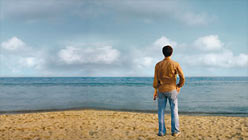Writer/director Fatih Akin’s The Edge of Heaven (Auf Der Anderen Seite) loses a lot in translation. The winner of the Best Screenplay Award at the 2007 Cannes Film Festival, The Edge of Heaven tells the interlocking stories of three families whose journeys take them from Turkey to Germany and back. Much of the film focuses on the interplay between the two cultures, and deftly uses language to indicate the generational and societal gaps between parents and children (in one family, Ali, the boorish father, speaks mostly Turkish, and his refined, professor son Nejat speaks mostly German). Unfortunately for the American viewer unfamiliar with German and Turkish, it is often difficult to identify which language each character is speaking. Every character in the movie speaks at least two languages, and when most switch rapidly between one and the other, the nuance of who is speaking what language in which situation gets lost.
Despite the struggle foreign viewers will have to grasp the richness of the film’s linguistic interaction, The Edge of Heaven still paints a vivid picture of a world in transition and a people at a crossroads. It’s a film of intersections between six lives, two generations, and two very different cultures. The characters are often searching for each other, looking in all the wrong places while the person they seek passes right by them, unrecognized. The story also weaves together the lives of parents and children, exploring the way people born into different eras can grow to resent the values of the other, and the way a mother’s attempts to protect her child from the truth can backfire in unforeseen ways.
But the most important intersection behind The Edge of Heaven is the one between the culture of the West and the culture of the Middle East, as embodied in the sociopolitical turmoil of modern-day Turkey. Amid talk of Turkey joining the European Union, gangs of liberal, vaguely socialist revolutionaries are rounded up and jailed by Turkish police. The unrest is both generational and cultural: the movie’s young Turks consider their country to be overly nationalistic, almost fascist, while Turkey’s adult generation looks with trepidation upon the increasing individualism and Westernization of its children. At least, that’s what appears to be happening; the movie never goes into detail about the politics behind the struggle, instead presenting us with the violent protests and leaving us to determine who’s on what side.
As a study, then, of foreignness, societal change, and a country caught between two worlds, The Edge of Heaven is a good but not a great piece. The information it presents is captivating, but it doesn’t present enough. Instead, writer/director Akin tries too hard to infuse the film with cleverness, showing us every time one character just misses finding the person he or she is looking for. It’s a tool that he overuses and that feels like an old trick anyway, and it detracts from the true drama of the film.
As a movie, The Edge of Heaven is similarly spotty. At times, the movie dazzles with its cinematography and its performances — Hanna Schygulla provides a memorable minute of silent anguish as the mother of a daughter who has just died. At other times, however, the narrative runs into dead ends and characters are forced to behave in ways that don’t make sense. This is especially problematic at the beginning of the film, which feels as if it is meant to be a major part of the storyline but is in reality more of a prologue. The script dashes through the meeting of an old Turkish man (played by Tunçel Turkiz) and a prostitute (Nursel Köse), pauses quickly to show us that the old man’s son (Baki Davrak) and the prostitute are falling in love, then kills the prostitute by the 28th minute. For a viewer knowing little about the movie, and thinking that these characters are going to be central to the film’s plot, the velocity of the moment is startling and unpleasant.


